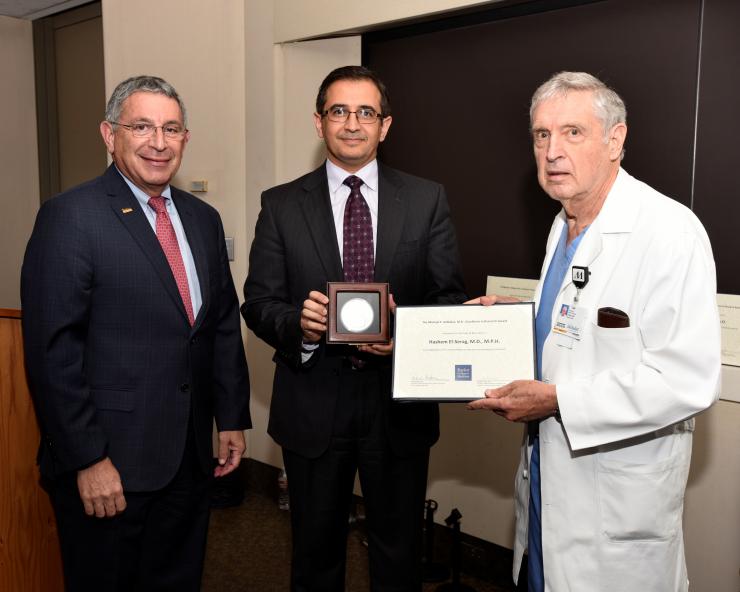2016 Recipient
Area: Medicine - Gastroenterology
Dr. Hashem El-Serag received this award for his focus on the epidemiology and clinical outcomes of hepatocellular carcinoma (HCC) and esophageal adenocarcinoma. His research was the first report of the rising trends in HCC incidence and its mortality and later work was among the first to report the connection between hepatitis C and HCC. His work on esophageal adenocarcinoma and its precursor lesion, Barrett’s esophagus, was important for reporting on rising GERD rates and the link between obesity and EAC, as well as for uncovering the inverse association between H pylori infection and the risk of Barrett’s esophagus and esophageal adenocarcinoma.
Recent research, reported in Gastroenterology, makes innovative use of hundreds of thousands of lab tests available in the national Veterans Administration registries among patients with hepatitis C related cirrhosis (the most common and virulent risk factor for HCC), and identifies a robust but simple to apply algorithm that offers a much improved predictive value for the risk of HCC in the next 6 months. This algorithm if validated could have immediate clinical impact. Another recent paper featured the largest retrospective cohort study of patients with hepatitis C and was the first study to examine the effect of viral genotype on the risk of developing HCC, strongly linking genotype 3 to risk of HCC and making viral genotype 3 a treatment priority irrespective of severity of liver disease. Recent research on Barrett’s esophagus has examined several important risk factors for its presence and progression, moving beyond conventional measures of obesity (like BMI) and into potentially more pathogenically relevant indicators. This study found that the amount of visceral abdominal fat (rather than total or subcutaneous fat) is the strongest independent risk factor for Barrett’s esophagus, and used sophisticated measures developed by Dr. El-Serag and his research colleagues to uncover the mechanisms behind it, opening a new avenue for research into the pathogenesis and markers of Barrett’s esophagus related EAC.
Dr. El-Serag's nomination was based on the following publications:
Kanwal F, Kramer JR, Ilyas J, Duan Z, El-Serag HB. HCV genotype 3 is associated with an increased risk of cirrhosis and hepatocellular cancer in a national sample of U.S. Veterans with HCV. Hepatology. 2014 Jul;60(1):98-105. doi: 10.1002/hep.27095. Epub 2014 May 27.
El-Serag HB, Kanwal F, Davila JA, Kramer J, Richardson P. A new laboratory-based algorithm to predict development of hepatocellular carcinoma in patients with hepatitis C and cirrhosis. Gastroenterology. 2014 May;146(5):1249-55.e1. doi: 10.1053/j.gastro.2014.01.045. Epub 2014 Jan 23.
El-Serag HB, Hashmi A, Garcia J, Richardson P, Alsarraj A, Fitzgerald S, Vela M, Shaib Y, Abraham NS, Velez M, Cole R, Rodriguez MB, Anand B, Graham DY, Kramer JR. Visceral abdominal obesity measured by CT scan is associated with an increased risk of Barrett's oesophagus: a case-control study. Gut. 2014 Feb;63(2):220-9. doi: 10.1136/gutjnl-2012-304189. Epub 2013 Feb 13.
DeBakey Award Nominations
Baylor College of Medicine faculty members are invited to nominate colleagues for Michael E. DeBakey, M.D., Excellence in Research Awards. Learn more.







 Credit
Credit
